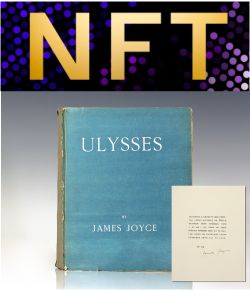 NFTs, or nonfungible tokens, are digital proofs of a purchase for goods like art, digital music and other valuable collectibles. When auction house Christie’s sold the NFT “Everydays: The First 5000 Days,” a collage by the artist Beeple, for $69.3 million in March of 2021, it signaled the dawn of a potential virtual fad. Data published by NonFungible, a data analytics company that covers the industry, showed that active NFT wallets dropped 88% during the six months between October 2021 and April 2022. Sales of NFTs also dropped 92% from a daily average of 225,000 to 19,000, during the same period.
NFTs, or nonfungible tokens, are digital proofs of a purchase for goods like art, digital music and other valuable collectibles. When auction house Christie’s sold the NFT “Everydays: The First 5000 Days,” a collage by the artist Beeple, for $69.3 million in March of 2021, it signaled the dawn of a potential virtual fad. Data published by NonFungible, a data analytics company that covers the industry, showed that active NFT wallets dropped 88% during the six months between October 2021 and April 2022. Sales of NFTs also dropped 92% from a daily average of 225,000 to 19,000, during the same period.
Without getting too technical about the storage of NFTs, blockchain, cryptocurrencies etc., it is important to point out the useful aspects of NFTs. NFTs can be used to verify the originality of a collectible, its title, description or owner. NFTs can also be used to authenticate and transfer ownership of a valuable collectible in the real world. A smart contract tracks the NFT token ownership, provenance and transaction history and operates as a ready-made standard for anyone to use. Each case is allocated a token with a unique identifier and its properties are stored as detailed metadata. Needless to say that all data entered in its blockchain must be authentic in order to be reliable. NFTs may also provide special access; they are already being used as tokens or passes into private online groups. Just imagine joining the “ABAA NFT Group” sometime in the near future!
An early adopter of the technology is Bayliss Rare Books based in the U.K. They are offering their first edition collection of Ian Fleming’s, James Bond titles alongside their NFT counterpart on the OpenSea marketplace. Whether the Bayliss venture proves to be successful remains to be seen. Our perspective on the use of such technology is that it would not be suitable for the majority of rare books, because of its additional overhead expenses. Unless the work is an earth-shattering masterpiece, or has some historical significance, it makes no sense to categorize it as “non-fungible”. The book must be unique in the sense that there is no equivalent one can trade it for.
Process innovation in the sense of optimizing the book trade and its logistics processes, is desirable if it results in a better, faster, cheaper trade. The Internet, for example, has unquestionably added to the liquidity of the market and enhanced the ability of booksellers to connect with customers. NFTs have the potential to help dealers and collectors track the provenance of a scarce, one-of-a-kind rare book for which there is no substitute. Every transaction is publicly available on a blockchain, which is a digital transaction ledger.
Unfortunately, for those who want to have their collections in the metaverse, there are a number of drawbacks to consider. First, there are costs to mint and manage NFTs. These additional costs vary of course, but as in most business transactions if the benefits outweigh the costs, it may be worth taking the risk. Secondly, there may be additional taxation implications. Although the IRS has yet to issue specific guidance, NTFs for rare books should be treated as collectibles, and therefore taxed as ordinary income if held for less than a year, or taxed at the top collectibles rate of 28% if held for more than a year. Thirdly, many NFT marketplaces require crypto, which comes with the added risk of the volatile exchange. However, more recently, some marketplaces have begun to accept dollars via credit card. Lastly, there are security concerns. NFTs require a private key that functions as a password. If your key is stolen, you may never again be able to access your NFT. The good news is that you should still have the book in your possession.
In the future, you could own NFT virtual land, with an NFT bookshop decorated with NFT rare books, but at the moment there is no obvious advantage to do so. The technology does not allow you to facilitate transactions which are considered impossible or very complicated and costly in the physical world.

{ 0 comments… add one now }